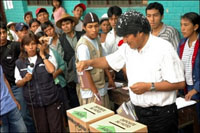Bolivia: President Morales gets narrow majority in future constitutional assembly
Exit polls give Evo Morales’ ruling party a close lead in Sunday elections to rewrite the constitution, which also included a referendum over the autonomy of the regions.

President Evo Morales’ ruling party won a narrow majority in Bolivia’s future constitutional assembly, which leaves the country’s leftist president far short of the number of the seats needed to single-handedly rewrite the country's constitution. According to exit polls, the Movement Toward Socialism (MAS) will control 130 seats in the 255-member assembly, or 51 percent of the seats, which is much more less than the 70 percent expected by the ruling coalition.
The main opposition Social Democtratic Party of former president Jorge Quiroga was expected to control 67 seats, the Nationalist Revolutionary Movement of another ex-president, Gonzalo Sanchez de Lozada, will have 18 seats, while the National Unity party gained 13, the poll showed. The remaining seats were divided among smaller groups.
Also the choice over the country’s autonomies showed a highly divided nation, with the government backed “No” wining by 53 to 47 percent, also according to exit polls released by the local media. Supporters of autonomy triumphed by a wide margin in four out of nine Bolivian provinces -- Santa Cruz, Tarija, Pando and Beni that are rich in natural resources and whose population is mostly white unlike the country's indigenous majority.
On the contrary, the poorer western provinces said No –also by a wide margin- confirming the country’s division over the autonomies. Meanwhile, the national electoral court said full official returns are unlikely to be known for another 25 days.
"We want to be an exemplary country in Latin America with the participation of the people. That is what is historical about today," the president told journalists ahead of the vote. However, Bolivians did not answer to their president’s appeals as, according to official returns, almost one third of the registered voters casted their ballots.
"By winning a majority in the assembly, we'll be in a position to offer jobs, dignity, hard work and a rebuilding of the natural resources for the people," Vice President Alvaro Garcia told a rally late Thursday as the official campaign ended.The right-wing opposition, led by Quiroga, painted a dire picture of what a Morales-inspired constitution would do. Quiroga warned some 200 followers in a recent rally at an upscale shopping mall that in the vote for a 255-seat constitutional assembly, "what is most dear to us is at stake: our freedom."
Sunday elections confirmed Evo Morales’ strong lead of the country, but also showed the nation is split politically, economically and geographically in two. While the oil, gas and soya rich eastern provinces claim for more autonomy not to feed the poor west, the poorest provinces in the highlands demand centralization of the incomes to better distribute them across the country.
The Constitutional Assembly will first meet in August and it will have to deal with the autonomies issue as as other relevant reforms as the government backed nationalization of the natural resources.
Hernan Etchaleco
Pravda.Ru
Photo: Evo Morales casts his ballot in the coca-grower’s area of Chapare, in the central department of Cochabamba.
Subscribe to Pravda.Ru Telegram channel, Facebook, RSS!




